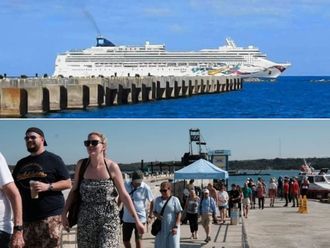DUBAI: Swiss private banking major Lombard Odier is keen to serve new growth markets of South East Asia, China, Middle East, India, Latin America and Central Asia that have witnessed substantial surge in private wealth over the past decade.
“Global wealth has been growing. Of course, there has been some major geographical shift. Lombard Odier has been expanding our geographical coverage with presence in 20 locations across the world,” said Patrick Odier, Global Senior Partner of Lombard Odier and Chairman of Swiss Banking Association.
According to BCG’s [Boston Consulting Group] global wealth report, global private financial wealth grew reached a total of $152 trillion (Dh558 trillion) last year. The rise was stronger than in 2012, when global wealth grew by 8.7 per cent. The key drivers, for the second consecutive year, were the performance of equity markets and the creation of new wealth in rapidly developing economies.
With the rising private wealth, assets booked across borders reached $8.9 trillion in 2013, an increase of 10.4 per cent over 2012. Offshore wealth is projected to grow at a solid compound annual growth rate (CAGR) of 6.8 per cent to reach $12.4 trillion by the end of 2018. The growth in offshoring is largely driven by investors in developing economies seeking higher levels of political and financial stability, greater depth in wealth management products and expertise, and geographic diversification.
The offshore model is expected thrive as wealth management clients leverage the differentiated value propositions that offshore centres provide. These include access to innovative products, highly professional investment and client relations terms, and security, which is most relevant for emerging markets including the Middle East markets.
Despite the growing regulatory pressures on offshore centres, most of the leading offshore assets booking centres continue to report brisk business. Last year Switzerland remained the leading offshore booking centre with $2.3 trillion in assets representing 26 per cent of global offshore assets.
Assets booked in Singapore and Hong Kong are projected to Grow at CAGRs of 10.2 per cent and 11.3 per cent respectively through 2018 and are expected to account collectively for 20 per cent of the total global offshore assets by that time.
Odier said some of the new offshore asset booking centres in Asia and Middle East including the Dubai International Financial Centre has the potential to become major global centers.
As new asset booking centers in Asia emerge he believes that it is time Switzerland entered accords with European governments to secure better access for the country’s asset and wealth managers to clients in European markets
New bilateral arrangements for the export of financial services to Germany, France, Italy and Spain are essential, after a Swiss vote in February to cap immigration complicated relations between Switzerland and the European Union.
Almost 12 years after Switzerland opened its borders to EU expatriates, its citizens reversed course last February endorsing limits on immigration. The Swiss vote damaged relations with the EU, undermining negotiations in other areas, including on separate EU proposals to ban Swiss banks from marketing their services directly to residents of the union.
Some EU countries only allow Swiss banks to solicit customers through offices in that country or elsewhere in the bloc. France, for example, bans the cross-border marketing of wealth management services. Most Swiss banks don’t have licensed subsidiaries, a costly proposition that only bigger companies such as UBS AG, Credit Suisse Group AG and Julius Baer Group Ltd. can easily afford.
The ability to market services from head offices in places like Zurich, Geneva and Basel is becoming more important to Switzerland’s financial industry. Swiss banks are facing competition from London, Luxembourg, Miami, Hong Kong and Singapore to be the offshore booking centre of choice for affluent individuals and families.












